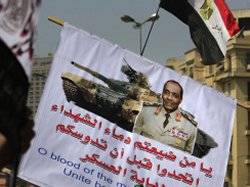Field Marshall Hussein Tantawi, Egypt's military ruler, has defended his testimony last month in the trial of toppled President Hosni Mubarak, and said that the army was never ordered to shoot protesters during the uprising earlier this year.
The remarks were made during a ceremony south of the capital, a week after Tantawi testified at the former president's trial under a total media blackout.
"We were not asked to fire at the people and we will never use fire," Tantawi was quoted as saying by the official Middle East News Agency on Sunday.
"My testimony in the case of the killings of the protesters was the testimony of a sincere man and a soldier of 40 years, one for God and Egypt... We were not ordered to open fire at citizens and we will never do that.''
Leaks of his testimony suggested that he sought to absolve Mubarak of any responsibility for the killing of about 850 protesters during the 18-day revolt that forced him to step down on February 11.
Mubarak is charged with complicity in the killings and if convicted, he could face the death penalty.
Tantawi was Mubarak's defense minister for about 20 years, and was widely believed to be blindly loyal to the former leader.
He and about two dozen generals sit on the now-ruling Supreme Council of the Armed Forces (SCAF) who took control of the country from Mubarak when he stepped down, pledging to return to the country to civilian rule after a transition period.
Protesters have grown increasingly frustrated with the army, which was called into the streets when police lost control on January 28.
They say it is protecting its former commander and that its use of emergency law reverts to the same tactics used by Mubarak to stifle dissent.
Election rules accepted
Also on Sunday, Egyptian political parties accepted concessions on election rules offered by the military, pulling back from threats to boycott Egypt's first multi-candidate vote since Mubarak was ousted.
The parties, seeking to keep former Mubarak allies out of parliament, had threatened to boycott the polls unless the army changed an election law to allow them to field candidates both on party lists and for seats allocated to individuals.
SCAF said on Saturday it would amend the law, set a clearer timetable for a move to civilian rule and would consider ending military trials for civilians and lifting of the 30-year-old emergency laws.
Political activists and parties said the army's statement had fallen short of meeting their demand of immediately lifting emergency laws and preventing remnants of Mubarak's dissolved ruling party from politics.
The parties meeting on Sunday said that although they have dropped the boycott threat, they would continue to press for the other demands to be met.
"We want the state of emergency to end and remnants of the regime to be barred from political life," an alliance of 34 parties, including the Muslim Brotherhood and liberal al-Wafd party, said in a statement.
Egypt's parliamentary elections are due to begin on Nov. 28.
PHOTO CAPTION
An Egyptian protester flashes his shoe to a banner showing Egypt's military ruler, Field Marshal Hussein Tantawi, during a protest at Tahrir Square, the focal point of the Egyptian uprising, in Cairo, Egypt, Friday, Sept. 30, 2011
Al Jazeera


 Home
Home Discover Islam
Discover Islam Quran Recitations
Quran Recitations Lectures
Lectures
 Fatwa
Fatwa Articles
Articles Fiqh
Fiqh E-Books
E-Books Boys & Girls
Boys & Girls  Articles
Articles










